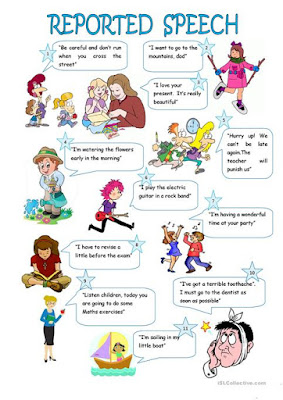MODALS –
DEDUCTION
Usamos verbos modales para decir qué tan seguros estamos de algo.
1 must
Usamos must cuando estamos seguros de que algo es cierto porque hay
pruebas muy sólidas.
• He must live near here
because he comes to work on foot. We don’t know where he lives but we’re sure
it’s not far away.
• Come inside and get warm
– you must be freezing out there.
• You’re a zookeeper? That
must be very interesting.
Notice that must is followed by an infinitive
without ‘to’.
2 might, may, could
Utilizamos might, may o might para decir que creemos que algo es posible pero no estamos seguros.
• Did you hear that? I
think there might be a burglar downstairs. She’s not sure there’s a burglar but
she thinks it’s possible.
• We’ll try to get there
early but we may arrive late if there’s a lot of traffic.
• Don’t put it up there.
It could fall off and hit someone.
Might, may and could are also followed by an infinitive without ‘to’.
3 can’t
Usamos no podemos cuando estamos seguros de que algo no es verdad.
• It can’t be a burglar.
All the doors and windows are locked. He doesn’t know it’s not a burglar but he
feels sure it’s not.
• It can’t be far away
now. We’ve been driving for hours. Where’s the map?
• Really? He has to work
on Christmas Day? He can’t feel very happy about that.
Like the other verbs, can’t is followed by an infinitive without ‘to’
TAG QUESTIONS
¿Qué son Tag
Questions?. Se trata de mini- preguntas que se utilizan al final de una
oración afirmativa o negativa y cuyo objetivo es negar o confirmar el contenido
de la frase. En español podemos decirlo de esta forma: ¿no?.
Reglas para tener en cuenta:
Reglas para tener en cuenta:
·
Utiliza Tag Questions en oraciones afirmativas.
·
Se utilizan siempre los verbos auxiliares.
·
Emplea Tag questions en negativo.
·
En oraciones negativas emplea tag question en positivo.
Veamos ahora algunos ejemplos para aplicar:
Oraciones afirmativas empleando el verbo TO BE en Presente Continuo o Simple. Verbo en negativo: isn't he?/ aren't you? /isn't it? /isn't she?/ aren't you? /aren't we?:
Oraciones afirmativas empleando el verbo TO BE en Presente Continuo o Simple. Verbo en negativo: isn't he?/ aren't you? /isn't it? /isn't she?/ aren't you? /aren't we?:
·
Pedro's
flying now, isn't he?. Pedro está volando en estos momentos, ¿no?.
·
You are
really tired, aren't you?. Estás muy cansado, ¿no?.
·
They're
very nice people, aren't they?. Son personas muy agradables,
¿no?.
NOTA: en inglés americano se utiliza la primera persona del
verbo to be como aren't I?, que es el equivalente de am I not?.
Oraciones negativas empleando el verbo TO BE en Presente Continuo o Simple. Verbo en positivo: am I? are you? is he? are we? is she? is it? are they? are you?:
Oraciones negativas empleando el verbo TO BE en Presente Continuo o Simple. Verbo en positivo: am I? are you? is he? are we? is she? is it? are they? are you?:
·
I'm not
late, am I?. No llego tarde, ¿no?.
·
It
isn't a beautiful day, is it?. No es un día hermoso, ¿verdad?.
·
Pedro
isn't flying now, is he?. Pedro no está volando en estos momentos,
¿no?.
Oraciones positivas empleando el verbo TO BE en Past
Continuo o Simple. Verbo en negativo: weren’t you? wasn't I? weren't they
weren't you? wasn't he? wan't she? wasn't it? weren't we?:
·
You
were studying at 6, weren't you?. Estuviste estudiando a las 6,
¿no?.
·
It was
a beautiful day, wasn't it?. Fue un día hermoso, ¿verdad?.
·
He was
flying when I phoned, wasn't he?. Estaba volando cuando llamé,
¿no?.
·
Martha
was angry, wasn't she?. Marta estaba enojada, ¿no?.
Oraciones negativas empleando el verbo TO BE en Past
Continuo o Simple. Verbo en positivo: was he? was she? was it? were we? were
you? was I? were you ?were they?:
·
Martha
wasn't angry, was she?. Marta no estaba enojada, ¿no?.
·
It
wasn't a beautiful day, was it?. No fue un día hermoso, ¿no?.
·
You
weren't studying at 6, were you?. No estuviste estudiando a las
6, ¿no?.



Comentarios
Publicar un comentario